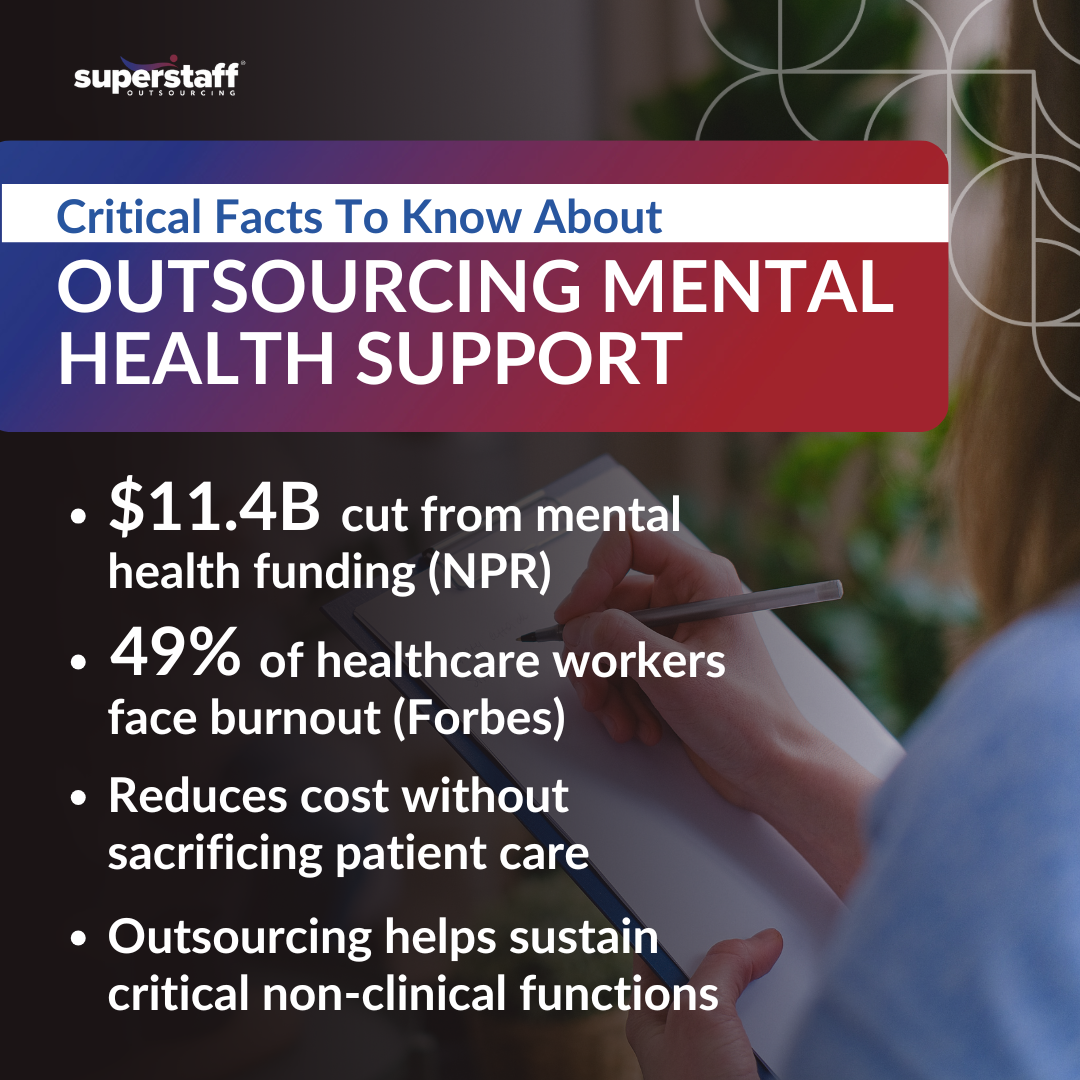
Mental health services in the U.S. are in crisis, and funding cuts are making things worse.
As federal budget allocations shrink, many public and nonprofit mental health programs are being forced to reduce staff, scale back services, or shut down entirely. Recognizing this harsh reality, this blog explores how outsourcing mental health support can help bridge critical operational gaps created by budget constraints.
The goal is to understand how strategic outsourcing can help preserve access to care by supporting essential non-clinical functions in struggling mental health systems.

Federal Budget Cuts Destabilize the Mental Health Care Ecosystem
Federal budget cuts are severely destabilizing mental health services nationwide, particularly following the recent abrupt cancellation of approximately $11.4 billion in COVID-era grants originally aimed at addiction, mental health, and related initiatives, according to NPR.
Sharp reductions in funds, state block grants, and vital public health budgets have left many community mental health programs struggling to maintain basic operations. These cuts disproportionately affect essential services like school counseling, rural outreach, and nonprofit clinics that cater to the most vulnerable populations.
With fewer counselors, therapists, and support staff available, waitlists are ballooning, patient outreach is faltering, and critical care coordination is increasingly disrupted, exacerbating burnout among already overstretched healthcare teams.
Administrative Inefficiencies Worsen Outcomes in Underfunded Programs
Administrative tasks may seem routine, but inefficiencies here compound problems in an already strained healthcare system. Without dedicated support for tasks like appointment scheduling, patient intake coordination, insurance verification, and billing, clinicians become increasingly pulled away from their primary focus—patient care. This problem intensified amid recent public health policy changes in 2025, notably the reduction in mental health funding.
In such an overstretched environment, clinicians frequently juggle multiple roles simultaneously: from caregiver to receptionist to billing specialist. It’s no surprise that healthcare workers now report the highest post-time-off burnout rate, with 49% experiencing burnout after returning from breaks, according to Forbes. As burnout worsens, patient interactions become shorter and less effective, diminishing overall care quality.
The resulting administrative errors, from billing mistakes to slow insurance claims processing, lead directly to lost revenue at a time when every dollar counts for mental health providers. Patients subjected to administrative confusion or delays lose trust in their providers, leading to missed appointments and compromised continuity of care.
Fortunately, outsourcing mental health support emerges as a practical, scalable alternative to alleviate these pressures.
Outsourcing Non-Clinical Roles Can Relieve Overloaded Mental Health Systems
By outsourcing mental health support for essential but non-clinical roles, facilities can ease pressure significantly. Offshoring administrative duties such as appointment setting, patient intake, claims processing, and insurance verification frees clinicians and onsite staff to focus solely on patient care. Moreover, when mental health providers turn to offshore teams, they can leverage cost-effective resources while benefiting from professional, round-the-clock operational support.
Offshore outsourcing firms are well-equipped to handle critical healthcare operations within HIPAA-compliant frameworks. Trained extensively in patient privacy regulations, these teams ensure patient information remains secure and confidential. Utilizing offshore teams also means continuous, around-the-clock availability for crucial functions such as patient appointment scheduling and follow-up calls, reducing delays, and improving patient engagement.
Moreover, outsourcing administrative tasks leads to improved cash flow and financial health. With dedicated outsourced billing teams proactively managing claims follow-up, fewer errors occur, reimbursement timelines improve, and resources are freed to support actual patient care.
This strategic decision has already proven effective for several mental health providers across the U.S.
Choosing the Right Outsourcing Partner Ensures Quality, Compliance, and Continuity
Not all outsourcing providers are alike, particularly regarding healthcare and mental health services. Selecting the right partner ensures that outsourcing mental health support yields the desired results. It’s essential for mental health organizations to seek BPO providers with substantial experience handling healthcare regulations, especially HIPAA compliance, and sensitivity to the unique aspects of behavioral health care.
Understanding nuances around patient confidentiality, ethical interactions, and complex administrative processes distinguishes seasoned outsourcing providers. Additionally, cultural empathy plays a crucial role in effective offshore outsourcing. Outsourced teams capable of culturally sensitive interactions ensure seamless patient experiences, fostering patient trust and satisfaction.
Particularly with the impact of significant public health policy changes in 2025, organizations must proactively choose partners demonstrating adaptability and a thorough understanding of the evolving healthcare landscape. Reliable outsourcing partners offer providers not only administrative support but also stability and continuity in uncertain economic climates.
Outsourcing Mental Health Support: A Sustainable Path Forward Amid Budget Cuts
Federal budget cuts are undeniably straining U.S. mental health services, threatening clinics, school programs, and community outreach. However, outsourcing mental health support offers a promising and sustainable way to preserve these vital services. Through strategic partnerships, providers can delegate critical yet non-clinical tasks, alleviating administrative burdens, reducing clinician burnout, and maintaining high-quality patient interactions.
Providers leveraging offshore teams can navigate complex administrative requirements and maintain operational integrity amidst funding instability. Outsourcing non-clinical roles such as appointment scheduling, patient intake, billing, and insurance verification can significantly impact the survival and effectiveness of mental health care programs nationwide.
Now more than ever, decision-makers need proactive strategies to combat the fallout of budget reductions. By carefully selecting a reputable, experienced outsourcing partner, mental health organizations can confidently move forward, preserving access to critical care services despite challenging budget environments.
The Impact of Federal Budget Cuts on Mental Health Services: Exploring Outsourcing Mental Health Support
Federal budget cuts have intensified the crisis facing mental health providers nationwide. As programs grapple with dwindling resources, the pressures mount: fewer available staff, prolonged patient wait times, rampant burnout, and a noticeable decline in care quality.
Yet, amid these challenges, outsourcing emerges as a practical lifeline, empowering providers to redirect precious resources back toward critical patient-facing activities. From streamlining administrative tasks like insurance verification and patient intake to enhancing revenue cycles through accurate billing processes, outsourcing mental health support ensures that organizations remain resilient, even when budgets are shrinking.
Choosing the right outsourcing partner is crucial, and this is where SuperStaff excels. With a proven track record supporting healthcare organizations, SuperStaff provides highly skilled offshore teams specifically trained in healthcare administration, patient care coordination, and stringent HIPAA compliance standards.
SuperStaff’s approach isn’t just about handling administrative tasks—it’s about alleviating burdens, improving patient experiences, and enabling mental health clinicians to focus solely on delivering exceptional care.
If your mental health services are feeling the pressure of federal budget reductions, now is the perfect time to act. Partnering with SuperStaff means more than just staying operational; it means ensuring sustainable, quality-driven mental health care for those who need it most.
Reach out to SuperStaff today, and let’s transform challenges into solutions—helping your organization deliver consistent care, without compromise!






